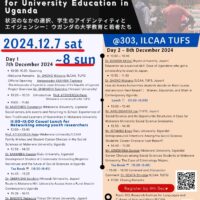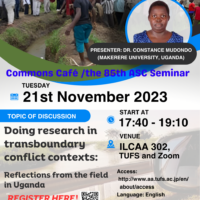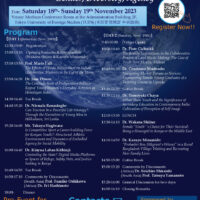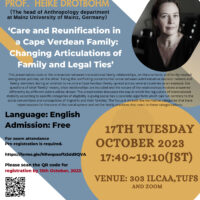The Youths & Digital Media Platforms in Rural Africa: Spaces for Refuge, Safety Nets, and Soliciting Justice
Laban Kithinji KINYUA (ILCAA Joint Researcher, Sophia University/TUFS)
Since the early 2000s, Kenya has been experiencing “disruptive raptures”, spurred in part by the liberalisation of media and digital spaces. In recent years, the youth, through the creative economy, have taken advantage of the digital “disruptive raptures,” seeking work, fame, and riches. As a consequence, Kenyans have volunteered or been made to tell their stories on digital platforms. Many of these stories have undertones of rumour and mirror the realities of daily life. This paper analyses the stories appearing on digital platforms in their social-political aspects, claiming that they are fundamental to revealing and forming social-political realities and convictions and that they are also key to elaborating contemporary social-political rationality in Kenya. I pursue this thesis by providing an in-depth analysis that shows how ordinary Kenyans are leveraging digital platforms to aptly illustrate the anxieties of their daily lives in a largely dysfunctional state. I explore stories appearing on three YouTube channels that broadcast in Gîkûyû and Swahili, claiming that actors make normative claims about their past and present. Through these claims, they affirm, re-enact, and problematize the struggles of their daily lives. The narrators weave dynamic networks with ordinary Kenyans as they appear on the channels. The “presence” of those who are listening engages them in reassembling resources, compelling them to volunteer to actively participate in the difficulties of storytellers as rescuers and offering to assist them in navigating the most challenging situations. The narrators represent contemporary dimensions of power in its present and thus inform us of the ongoing discourses of power and other social spheres. As a result, the channels provide the agency for the ordinary individuals who volunteer to tell their stories or who are recruited by the story providers to appear on their channels. In addition, the channels offer single-work representation for the self-made media personalities.
発表者
Presentation2: 「中東にむかう女性たち―ケニアにおける’ハウスガール’の最近の状況」
“Women going to the Middle East: the recent condition of ‘housegirls’ in Kenya”
椎野若菜(AA研)Wakana Shiino (ILCAA)
2019年より、住み込みで働く「ハウスガール」と呼ばれる女性たちの調査を続けている。父系男系制の村落における伝統的規範から外れた、シングルマザーとなった女性たちが、身の落ち着き先、就職先として選ぶことが多い。80年代、90年代、2000年代、そしてコロナ禍以降の動きについて発表した。コロナ禍以降、急速に中東へむかう「ハウスガール」が増加している。中東へ向かう女性たちは、ケニアの首都ナイロビをはじめとする都市に出てハウスガールとして働く女性とは動機や背景が異なる。ただ共通してみられることは、女性が、自らの子どもやキョウダイのためにときとして命の危険がある中東へのハウスガールのなるために渡航することである。また、セカンダリーで教育を受けた、リタラシーの高い女性が多かった。
 en_US
en_US ja
ja







